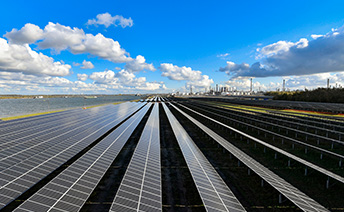American Petroleum Institute (API)
API is the only national industry association that represents members from across all parts of the oil and natural gas industry in the USA.[1] It is the major standard-setting organisation for the industry.[2] API’s mission is to promote safety across the industry globally and to influence public policy in support of a strong, viable oil and natural gas industry in the USA.[3]
Membership of board/executive committee: Shell is a member of the board of directors and the executive committee.
- 2022 assessment outcome: Some misalignment
- 2021 assessment outcome: Some misalignment
Summary
Shell benefits from its membership of API, including API’s representation of the industry with regulatory agencies and in legal proceedings. We welcome API’s advocacy on a range of state and federal issues, including trade, transport, taxes and the environment.
API sets safety, environmental and technical standards for oil and natural gas companies. It creates certification programmes for people working in the industry and for products, allowing us to bring them to market. API is also a leading voice on key issues that impact our customers, including standards for biofuels. We recognise API’s leading role in creating the Environmental Partnership.
We have found API to have some misalignment with our climate and energy transition-related policy positions.
We believe that API is advocating more constructively on climate than previously, especially on carbon pricing and methane regulation. We note that API opposed the Inflation Reduction Act of 2022.[4] API opposed the legislation mainly on the basis of tax increases, rather than its climate and clean energy provisions. API stated support for the extension of CCUS tax credits in the legislation.[5] Shell supported the legislation, which has been described as the “largest climate investment in American history”.[6]
We will urge API to:
- State support for net-zero emissions by 2050 and engage in sustained and constructive advocacy in support of the US target to achieve net-zero emissions by 2050.
- State support for ending routine flaring by 2030 or sooner.
We will encourage API to:
- Support improving energy efficiency through standards and regulatory instruments covering key sectors of the economy.
- Further advance policies to make meaningful reductions in road transport carbon emissions.
We will remain a member of API at the current time. We will continue to track alignment between API’s climate and energy transition-related positions and our own and will be transparent about where we find differences. We will continue to engage the association in areas where we have different views, including through our positions on API’s climate committee, board and executive committee.
Further information
Click on the sections below to read more.
- API has stated that it supports the ambitions of the Paris Agreement.[7] [8] [9]
- API has not stated a position in support of net-zero emissions by 2050. In a statement in response to the IEA’s 2021 Net Zero by 2050 report, API stated that “industry shares the goal for a lower carbon future” but did not state support for net-zero emissions; it also stated that “any pathway to net zero must include continued innovation and use of natural gas and oil, which remains crucial to displacing coal in developing nations and enabling renewable energy.”[10]
- API opposed the US Inflation Reduction Act of 2022, mainly due to concerns about tax increases and that the Act “fails to address permitting reform”.[11] API did state support for the extension of CCUS tax credits in the legislation.[12] Shell stated support for the legislation, which has been described as the “largest climate investment in American history”.[13] It is noted that in 2021, API stated support for the Infrastructure Investment and Jobs Act, which Shell also supported.[14]
- In its January 2022 State of American Energy report, API references the IEA’s 2021 World Energy Outlook (WEO) Stated Policies Scenario and states that “oil and natural gas are projected to supply 50 percent of the world’s energy in 2050.” It does not reference the other IEA scenarios in the report.
- API has stated support for carbon pricing.[15]
- In its 2022 State of American Energy Report, API states that “a government carbon price policy is the most impactful and transparent path to further reduce carbon emissions.”[16] It also stated its support for carbon pricing in a number of responses to consultations.[17] [18]
- API states support for facilitating “meaningful GHG emissions reductions and conservation from all sectors of the economy”.[19]
- API has stated support for policies that advance the technology-neutral development of low-carbon hydrogen.[20] API has stated that “expanding the role of hydrogen in decarbonisation requires cost-effective production of low-carbon hydrogen from all sources.”[21]
- In 2022, API published its “10 for 2022” policy plan, which states that Congress should create a new tax credit to support clean hydrogen from all sources; it also provided the plan to President Biden.[22] [23]
- In 2022, API submitted comments on the Department of Energy’s National Clean Hydrogen Strategy and Roadmap.[24] API stated that it is “supportive of DOE’s efforts to advance a clean hydrogen economy and recognizes the essential role that hydrogen can play in meeting emission goals.”[25]
- A 2022 report commissioned by API, “The potential role of blue hydrogen in reducing emissions within the US market”, highlights the potential role of hydrogen in the US energy market, including both ‘blue’ and ‘green’ hydrogen.[26]
- API states that federal climate policy should “focus on net emissions”, adding that “attention should be given to net GHG emissions such that ongoing voluntary actions are recognized and the trading and use of applicable credits and offsets is allowed.”[27]
- In an October 2022 submission to the Commodity Futures Trading Commission, API stated that “well-designed and transparent carbon markets, whether voluntary or mandatory, are important tools in reducing GHG emissions across a large set of market participants. However, for a voluntary carbon market (VCM) to play an impactful role in addressing climate change, it is necessary to ensure that a VCM is transparent, liquid, global, and represent high-integrity carbon offsets.”[28]
- API has stated support for policies that accelerate the deployment of carbon capture, utilisation and storage (CCUS).[29]
- In 2022, API published its “10 for 2022” policy plan, which states “Congress should expand and extend the Section 45Q tax credits for carbon capture, utilization and storage”; it also provided the plan to President Biden.[30] [31]
- In its 2022 statement on House passage of the Inflation Reduction Act, API stated support for the Act’s “important steps toward [...] investments in carbon capture and storage”.[32]
- In an April 2022 letter to the Council on Environmental Quality, API stated that it “supports efforts by this administration to improve coordination across agencies, permitting, and regulatory processes to better enable the safe and effective deployment of CCUS technologies”.[33]
- API has stated support for the principle of “timely and accurate reporting of GHG emissions from all emitting sectors in the economy.”[34] In its 2022 response to the SEC’s proposed climate-related disclosure rule, API reiterated this support, but stated it had a number of concerns with the SEC’s current proposed rule. Shell stated support for the SEC’s proposal, but also noted a number of concerns.[35]
- API is supportive of transparency in sustainability reporting in the oil and gas sector. API, in collaboration with the International Association of Oil & Gas Producers (IOGP) and Ipieca, produced sustainability reporting guidance for the oil and gas industry in 2020 that references other reporting frameworks including the Task Force on Climate-related Financial Disclosures (TCFD), the International Organization for Standardization (ISO), the Global Reporting Initiative (GRI) and CDP frameworks.[36] [37]
- In 2022, API published its Guidance Document for GHG Reporting, which aims to “drive consistency of voluntary reporting by individual oil and natural gas companies of a core set of company-wide GHG indicators”.[38]
- API has not stated a position on sustainable finance taxonomies.
- API has stated that “fuel-switching from coal to natural gas in the power sector has been the leading driver of emissions reductions in the United States, a trend further aided by a significant increase in deployment of wind and solar.”[39]
- API has stated that it “supports fuel- and technology-neutral approaches to addressing emissions in the electricity sector” and believes that any Clean Energy Standard under consideration “should include natural gas and recognize and value the many benefits natural gas provides to an increasingly lower-carbon electricity grid”.[40]
- API has recognised a role for renewable energy, stating “growing global energy demands for affordable, reliable and lower-carbon energy require the contributions of all energy sources, and that those sources work together. Natural gas is the essential backstop and partner for growth of intermittent renewable energy from wind and solar.”[41]
- API has stated that “natural gas is the essential backstop and partner for growth of intermittent renewable energy from wind and solar.”[42]
- API has stated support for reducing methane emissions.[43] API has stated that it “supports cost-effective policies and direct regulation that achieve methane emission reductions from new and existing sources across the supply chain”.[44]
- In January 2022, API submitted comments on the EPA’s proposed methane regulations for new and existing sources.[45] [46] In the submission, API stated that it “supports the cost-effective direct regulation of methane from new and existing sources across the supply chain, and directionally supports the EPA proposal to reduce VOC and methane emissions”.[47] API also stated that “reducing methane emissions is a priority for our industry, and we are committed to advancing the development, testing and utilization of new technologies and practices to better understand, detect and further mitigate emissions.”[48]
- API plays a leading role in the Environmental Partnership. The Environmental Partnership “includes a flaring management program that focuses on companies sharing information on best practices, advancing new and proven technologies, fostering collaboration to reduce emissions and collecting data to guide efforts to minimize flaring”.[49]
- In August 2022, API was signatory to an industry letter that opposed the Inflation Reduction Act, including the “$6.3 million natural gas tax” (also known as the methane fee).[50] Shell supported the Inflation Reduction Act, including a workable methane fee. While we took differing positions on the methane fee, we recognise that API opposed it due to potential duplication with existing methane regulation.
- API has stated that it “supports company efforts toward no routine flaring by a date certain [sic], for example the World Bank’s Zero Flaring Initiative by 2030”.[51]
- According to the Environmental Partnership’s 2022 Annual Report: “Since the launch of the flare management program in 2020, The Partnership has advanced best practices to reduce flare volumes, promote the beneficial use of associated gas and improve flare reliability and efficiency when flaring is necessary.”[52]
- API has stated support for “technology-neutral policies at the federal level that drive GHG emissions reductions in the transportation sector, taking a holistic approach to fuels, vehicles, and infrastructure systems”.[53]
- In its 2022 State of American Energy Report, API states that it “supports federal policy to drive near-term and ongoing CO2 emissions reductions relating to transport, and that “establishing a carbon intensity standard for the motor fuel pool that declines over time is one way to achieve these reductions.”[54] API states that “federal fuels and transportation policies should allow all vehicles and fuel technologies to freely compete on a level playing field to reduce transportation-sector emissions.”[55]
- API does not support mandates for zero-emission vehicles, stating that “zero emission vehicle (ZEV) mandates that ban new gasoline- and diesel-fueled vehicles limit options for Americans who can’t afford a ZEV or might prefer a conventionally powered vehicle. Further, such mandates eliminate the opportunity to reduce GHG emissions through high-efficiency vehicles powered by lower carbon-intensity fuels.”[56] Shell supports the California rule that requires all new passenger vehicles sold in California to be zero-emissions by 2035; however, we believe there needs to be a more comprehensive clean infrastructure plan that accompanies such a phase-out.
- API has stated support for “technology-neutral policies at the federal level that drive GHG emissions reductions in the transportation sector”, adding that it takes a “holistic approach to fuels, vehicles, and infrastructure systems”.[57]
- API’s 2022 State of American Energy report states that “federal fuels and transportation policies should allow all vehicles and fuel technologies to freely compete on a level playing field to reduce transportation-sector emissions. ”[58] It also states that “a ZEV mandate for medium- and heavy-duty trucks and vans could postpone air quality improvements by decades and forgo opportunities for other technologies to deliver earlier and more cost-effective solutions.”[59]
No position
No position
No position
[1] https://www.api.org/about
[2] https://www.api.org/products-and-services/standards
[3] https://www.api.org/about
[4] https://www.api.org/~/media/files/news/2022/08/11/joint-trades-letter-pelosi-mccarthy-ira-081122?source=email
[5] https://www.api.org/news-policy-and-issues/news/2022/08/07/api-statement-on-inflation-reduction-act
[6] https://www.ceres.org/news-center/press-releases/corporate-leaders-call-congress-promptly-pass-inflation-reduction-act
[7] https://www.api.org/-/media/Files/EHS/climate-change/2021/api-climate-action-framework.pdf?la=en&hash=E6BB3FA3013B52153E10D3E66C52616E00411D20
[8] https://www.api.org/news-policy-and-issues/news/2021/04/22/api-on-administration-ndc-announcement
[9] https://comments.cftc.gov/PublicComments/ViewComment.aspx?id=70837&SearchText=american%20petroleum
[10] https://www.api.org/news-policy-and-issues/news/2021/05/18/api-statement-on-iea-report-on-pathway-to-net-zero-by-2050
[11] https://www.api.org/~/media/files/news/2022/08/11/joint-trades-letter-pelosi-mccarthy-ira-081122?source=email
[12] https://www.api.org/news-policy-and-issues/news/2022/08/07/api-statement-on-inflation-reduction-act
[13] https://www.ceres.org/news-center/press-releases/corporate-leaders-call-congress-promptly-pass-inflation-reduction-act
[14] https://www.api.org/news-policy-and-issues/news/2021/08/04/bif-statement
[15] https://www.api.org/climate
[16] https://events.api.org/wp-content/uploads/2022/01/07-API-SOAE-Report-Fullreport-pages.pdf
[17] https://www.sec.gov/comments/s7-10-22/s71022-20131811-302248.pdf
[18] https://comments.cftc.gov/PublicComments/ViewComment.aspx?id=70837&SearchText=american%20petroleum
[19] https://www.api.org/news-policy-and-issues/climate-change
[20] https://www.api.org/-/media/Files/EHS/climate-change/2021/api-climate-action-framework.pdf?la=en&hash=E6BB3FA3013B52153E10D3E66C52616E00411D20
[21] https://www.api.org/climate
[22] https://www.api.org/news-policy-and-issues/10-in-2022
[23] https://www.api.org/~/media/Files/News/2022/06/14/Letter-to-President-Biden-on-10-in-2022-Plan
[24] https://www.api.org/~/media/files/news/2022/12/02/api-doe-draft-clean-hydrogen-roadmap-comments
[25] https://www.api.org/~/media/files/news/2022/12/02/api-doe-draft-clean-hydrogen-roadmap-comments
[26] https://www.api.org/~/media/Files/News/2022/10/12/API-ICF-Hydrogen-Report
[27] https://www.api.org/-/media/Files/EHS/climate-change/2021/api-climate-action-framework.pdf?la=en&hash=E6BB3FA3013B52153E10D3E66C52616E00411D20
[28] https://comments.cftc.gov/PublicComments/ViewComment.aspx?id=70837&SearchText=american%20petroleum
[29] https://www.api.org/-/media/Files/EHS/climate-change/2021/api-climate-action-framework.pdf?la=en&hash=E6BB3FA3013B52153E10D3E66C52616E00411D20
[30] https://www.api.org/news-policy-and-issues/10-in-2022
[31] https://www.api.org/~/media/Files/News/2022/06/14/Letter-to-President-Biden-on-10-in-2022-Plan
[32] https://www.api.org/news-policy-and-issues/news/2022/08/12/api-statement-on-house-passage-of-the-inflation-reduction-act
[33] https://www.regulations.gov/comment/CEQ-2022-0001-0136
[34] https://www.api.org/-/media/Files/EHS/climate-change/2021/api-climate-action-framework.pdf?la=en&hash=E6BB3FA3013B52153E10D3E66C52616E00411D20
[35] https://www.api.org/news-policy-and-issues/news/2022/06/17/api-urges-sec-to-consider-alternative-approaches-to-climate-related-reporting
[36] https://www.ipieca.org/work/sustainability/performance-reporting/sustainability-reporting-guidance
[37] https://www.api.org/-/media/files/ehs/climate-change/2021/api-climate-action-framework.pdf?la=en&hash=E6BB3FA3013B52153E10D3E66C52616E00411D20
[38] https://www.api.org/-/media/Files/Policy/ESG/GHG/Guidance-API-Template-for-Climate-related-Reporting-Initiative-March-2022.pdf?la=en&hash=44F7B339AB25B383E74EA991E8AF50B971EBC6CD
[39] https://www.api.org/-/media/Files/EHS/climate-change/2021/api-climate-action-framework.pdf?la=en&hash=E6BB3FA3013B52153E10D3E66C52616E00411D20
[40] https://www.api.org/-/media/Files/EHS/climate-change/2021/api-climate-action-framework.pdf?la=en&hash=E6BB3FA3013B52153E10D3E66C52616E00411D20
[41] https://events.api.org/wp-content/uploads/2022/01/07-API-SOAE-Report-Fullreport-pages.pdf
[42] https://events.api.org/wp-content/uploads/2022/01/07-API-SOAE-Report-Fullreport-pages.pdf
[43] https://www.api.org/-/media/Files/EHS/climate-change/2021/api-climate-action-framework.pdf?la=en&hash=E6BB3FA3013B52153E10D3E66C52616E00411D20
[44] https://www.api.org/climate
[45] https://www.api.org/news-policy-and-issues/news/2022/01/31/api-supports-epa-methane-rulemaking-effort-suggests-improvements
[46] https://www.api.org/-/media/Files/News/Letters-Comments/2022/2022-01-31%20API-Comments-NSPS-OOOOb-and-EG-OOOOc.pdf
[47] https://www.api.org/-/media/Files/News/Letters-Comments/2022/2022-01-31%20API-Comments-NSPS-OOOOb-and-EG-OOOOc.pdf
[48] https://www.api.org/-/media/Files/News/Letters-Comments/2022/2022-01-31%20API-Comments-NSPS-OOOOb-and-EG-OOOOc.pdf
[49] https://www.api.org/-/media/Files/EHS/climate-change/2021/api-climate-action-framework.pdf?la=en&hash=E6BB3FA3013B52153E10D3E66C52616E00411D20
[50] https://www.api.org/~/media/files/news/2022/08/11/joint-trades-letter-pelosi-mccarthy-ira-081122?source=email
[51] https://www.api.org/-/media/Files/EHS/climate-change/2021/api-climate-action-framework.pdf?la=en&hash=E6BB3FA3013B52153E10D3E66C52616E00411D20
[52] https://theenvironmentalpartnership.org/wp-content/uploads/2022/09/API-TEP-Annual-Report-2022.pdf
[53] https://www.api.org/-/media/Files/EHS/climate-change/2021/api-climate-action-framework.pdf?la=en&hash=E6BB3FA3013B52153E10D3E66C52616E00411D20
[54] https://events.api.org/reports/soae-2022/
[55] https://events.api.org/reports/soae-2022/
[56] https://events.api.org/reports/soae-2022/
[57] https://www.api.org/-/media/Files/EHS/climate-change/2021/api-climate-action-framework.pdf?la=en&hash=E6BB3FA3013B52153E10D3E66C52616E00411D20
[58] https://events.api.org/wp-content/uploads/2022/01/07-API-SOAE-Report-Fullreport-pages.pdf
[59] https://events.api.org/wp-content/uploads/2022/01/07-API-SOAE-Report-Fullreport-pages.pdf










